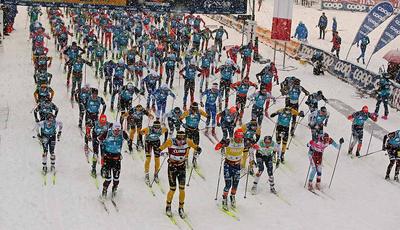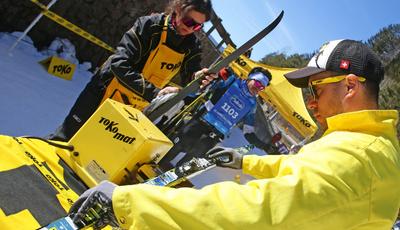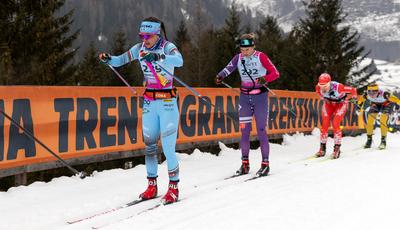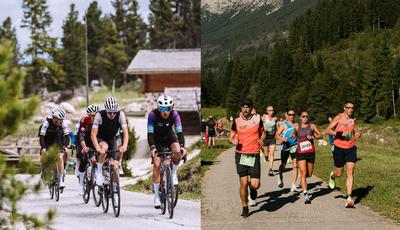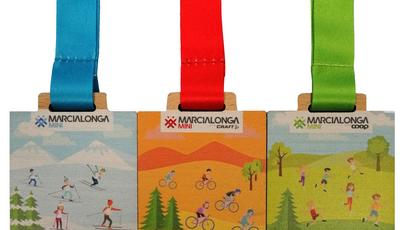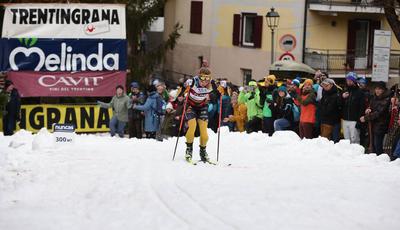EVENTS CALENDAR
MARCIALONGA...' SUPERSPRINT
NOT JUST THE LONG-DISTANCE RACE IN FIEMME AND FASSA
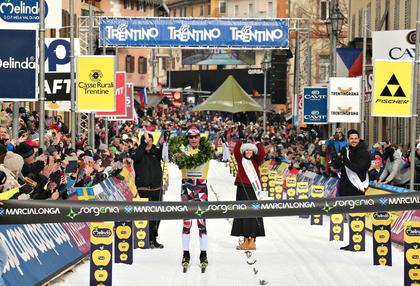
| News date | 27.12.2019 |
47th edition of Marcialonga of Fiemme and Fassa on 26th January
Supersprint, a new race format in Viale Mendini, Cavalese
Marcialonga Science presents the results of a new study
The 47th edition of Marcialonga of Fiemme and Fassa will be held on 26th January. Besides the long-distance race, with start in Moena and finish in Cavalese, the program includes Marcialonga Story, Stars, Baby, Mini and Young to be held from 24th to 26th January. This year, the Organising Committee will also organise a Supersprint – World Tour Championship, which is included in the World Sprint Series program. This race is scheduled for Friday 24th January in Cavalese, on the final 100-meter straight of Marcialonga. The World Sprint Series season kicked off in Östersund, Sweden. The victory went to Norway’s Ludwid Søgner Jensen ahead of Sweden’s Marcus Grate. Norway’s Ragnar Bragvin Andresen finished third, while Sweden’s Johannes Hortlund raced to a fourth-place finish. Italy’s Emanuele Becchis was beaten in the semi-finals. On the women’s side, Norway’s Marte Nordlunde took home the victory. The next race will be held in Dresden on 10th January, while the third race is scheduled for 24th January in Val di Fiemme. Then, there will be the König Ludwig Lauf, Moscow, the Janteloppet of Petter Northug, who probably takes part in Marcialonga, and Vålådalen in Sweden. The Supersprint races may also draw strong World Cup athletes, including Johannes Høsflot Klæbo, Petter Northug, Federico Pellegrino and the roller ski sprinters Emanuele Becchis and Alessio Berlanda.
For the fifth edition of Marcialonga Science, CeRiSM (Mountain Sport and Health Research Centre, University of Verona) in collaboration with the Organising Committee of Marcialonga promoted the “MarcialongaScience on Elderly” study. This study aims to collect data on the physiological condition and socio-emotional health of skiers over 65 years of age, who have been taking part in Marcialonga for several years. The study involves 40 cross-country skiers from Italy (36 men and 4 women). Three important results have been obtained compared to the healthy, inactive population of the same age: "better physiological values such as blood values, cardiovascular health, body composition (low % of fat mass), muscle strength and breathing capacity; exceptionally-above-average values for balance control and reaction time; far-above-average values for quality of sleep and perception of quality of life". The data do not change by elderly people (60-70 and 70-80) compared to the normal physical and mental decay of the corresponding inactive population. It should also be emphasised that the results do not depend on the competition results. In fact, the most important thing is to do 6-8 hours of physical exercise per week to ensure excellent physical and physiological performances. The "take-home messages" of the study are therefore that the health of people over 65 depends on the regular physical exercise rather than on the competitive level, and that ... "cross-country skiing is an excellent model of physical exercise for successful ageing".
©Newspower
47th edition of Marcialonga of Fiemme and Fassa on 26th January
Supersprint, a new race format in Viale Mendini, Cavalese
Marcialonga Science presents the results of a new study
Supersprint, a new race format in Viale Mendini, Cavalese
Marcialonga Science presents the results of a new study
The 47th edition of Marcialonga of Fiemme and Fassa will be held on 26th January. Besides the long-distance race, with start in Moena and finish in Cavalese, the program includes Marcialonga Story, Stars, Baby, Mini and Young to be held from 24th to 26th January. This year, the Organising Committee will also organise a Supersprint – World Tour Championship, which is included in the World Sprint Series program. This race is scheduled for Friday 24th January in Cavalese, on the final 100-meter straight of Marcialonga. The World Sprint Series season kicked off in Östersund, Sweden. The victory went to Norway’s Ludwid Søgner Jensen ahead of Sweden’s Marcus Grate. Norway’s Ragnar Bragvin Andresen finished third, while Sweden’s Johannes Hortlund raced to a fourth-place finish. Italy’s Emanuele Becchis was beaten in the semi-finals. On the women’s side, Norway’s Marte Nordlunde took home the victory. The next race will be held in Dresden on 10th January, while the third race is scheduled for 24th January in Val di Fiemme. Then, there will be the König Ludwig Lauf, Moscow, the Janteloppet of Petter Northug, who probably takes part in Marcialonga, and Vålådalen in Sweden. The Supersprint races may also draw strong World Cup athletes, including Johannes Høsflot Klæbo, Petter Northug, Federico Pellegrino and the roller ski sprinters Emanuele Becchis and Alessio Berlanda.
For the fifth edition of Marcialonga Science, CeRiSM (Mountain Sport and Health Research Centre, University of Verona) in collaboration with the Organising Committee of Marcialonga promoted the “MarcialongaScience on Elderly” study. This study aims to collect data on the physiological condition and socio-emotional health of skiers over 65 years of age, who have been taking part in Marcialonga for several years. The study involves 40 cross-country skiers from Italy (36 men and 4 women). Three important results have been obtained compared to the healthy, inactive population of the same age: "better physiological values such as blood values, cardiovascular health, body composition (low % of fat mass), muscle strength and breathing capacity; exceptionally-above-average values for balance control and reaction time; far-above-average values for quality of sleep and perception of quality of life". The data do not change by elderly people (60-70 and 70-80) compared to the normal physical and mental decay of the corresponding inactive population. It should also be emphasised that the results do not depend on the competition results. In fact, the most important thing is to do 6-8 hours of physical exercise per week to ensure excellent physical and physiological performances. The "take-home messages" of the study are therefore that the health of people over 65 depends on the regular physical exercise rather than on the competitive level, and that ... "cross-country skiing is an excellent model of physical exercise for successful ageing".
back to list
NEWS
MARCIALONGA STORE
SPONSOR & PARTNER
Main Sponsors




Official Sponsors


Sustainable Partner

Official Suppliers























Official TV Broadcaster

Institutional Partners






Friends


Under the patronage of







